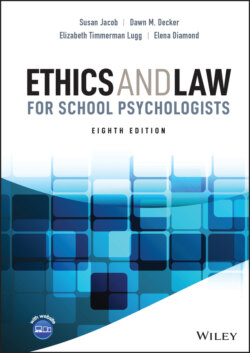Читать книгу Ethics and Law for School Psychologists - Susan Jacob - Страница 76
Privacy Rights
ОглавлениеNo “right to privacy” is mentioned expressly in the Constitution. A number of different privacy rights have been carved out of the First Amendment concept of “liberty,” Fourth Amendment prohibition against unreasonable search and seizure, Fifth Amendment protections against self-incrimination, and Ninth Amendment reservation of rights to the people (Hummel et al., 1985). The courts generally have held that students have a Fourth Amendment right to be free from unreasonable search and seizure in the schools. More specifically, the courts have ruled that students have a legitimate expectation of privacy rights with regard to their person and possessions, but they have allowed a more lenient standard of “reasonable suspicion” as opposed to “probable cause” for conducting searches in school (privacy is discussed further in Chapter 3).
The right to informational privacy has been acknowledged in several Supreme Court opinions (e.g., Whalen v. Roe, 1977). A lower court described this right as protecting “the individual from government inquiry into matters in which it does not have a legitimate and proper interest” (Eastwood v. Depart. of Corrections of State of Okl., 1988, p. 631). However, because the Supreme Court has not provided guidance on the meaning of informational privacy, the lower courts have defined it with various broad or narrow interpretations (Waldman, 2015). The lower courts also have adopted differing tests with regard to whether an individual’s informational privacy interests have been violated by a government actor. Most, however, use a balancing test that weighs the government’s interest in the invasion of informational privacy against the individual’s privacy interests. Furthermore, “case law is also murky as to whether the informational privacy right applies to government acquisition of personal information or whether it solely covers the further disclosure of such information” (p. 708).
At least three federal circuits have ruled that minors have informational privacy rights, but the implication of these rulings for public school students and their parents is not clear (Waldman, 2015). Do such rulings provide greater informational privacy rights to students and their families than afforded by federal public education laws (e.g., Family Educational Rights and Privacy Act of 1974)? In an older court case, a federal district court ruled that parents of schoolchildren have a right to be free from the invasion of family privacy by the school (Merriken v. Cressman, 1973). In light of contemporary concerns about the collection of extensive quantities of personally identifiable student information by schools and its disclosure to third parties (Reidenberg et al., 2013), future court decisions may provide new guidance on the appropriate balance between the school’s need for information about students and their families and the right of students and parents to be free from inquiry into matters in which the school does not have “a legitimate and proper” interest.
